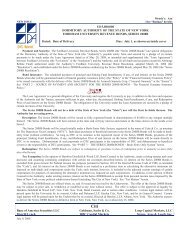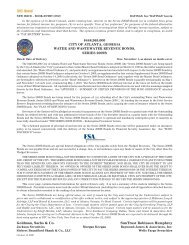Cleveland Clinic Health System Obligated Group - FMSbonds.com
Cleveland Clinic Health System Obligated Group - FMSbonds.com
Cleveland Clinic Health System Obligated Group - FMSbonds.com
You also want an ePaper? Increase the reach of your titles
YUMPU automatically turns print PDFs into web optimized ePapers that Google loves.
judicial action by a federal or state agency or a private party. The most <strong>com</strong>mon areas of potential liability are jointactivities among providers with respect to payor contracting, medical staff credentialing, and use of a hospital’slocal market power for entry into related health care businesses. From time to time, an <strong>Obligated</strong> Issuer may beinvolved in joint contracting activity with other hospitals or providers. The precise degree to which this or similarjoint contracting activities may expose <strong>Obligated</strong> Issuers to antitrust risk from governmental or private sources isdependent on specific facts which may change from time to time. A U.S. Supreme Court decision now allowsphysicians who are subject to adverse peer review proceedings to file federal antitrust actions against hospitals.Hospitals regularly have disputes regarding credentialing and peer review, and therefore may be subject to liabilityin this area. In addition, hospitals occasionally indemnify medical staff members who are involved in suchcredentialing or peer review activities, and may also be liable with respect to such indemnity. Recent courtdecisions have also established private causes of action against hospitals which use their local market power topromote ancillary health care business in which they have an interest. Such activities may result in monetaryliability for the participating hospitals under certain circumstances where a <strong>com</strong>petitor suffers business damage.Government or private parties are entitled to challenge joint ventures that may injure <strong>com</strong>petition. Liability in anyof these or other antitrust areas of liability may be substantial, depending on the facts and circumstances of eachcase, and may have a material adverse impact on the <strong>Obligated</strong> Issuers.Nationwide Nursing Shortage<strong>Health</strong> care providers depend on qualified nurses to provide quality service to patients. There is currently anationwide shortage of qualified nurses. This shortage and the more stressful working conditions it creates for thoseremaining in the profession are increasingly viewed as a threat to patient safety and may trigger the adoption of stateand federal laws and regulations intended to reduce that risk. For example, some states are considering legislationthat would prohibit forced overtime for nurses. In response to the shortage of qualified nurses, health care providershave increased and could continue to increase wages and benefits to recruit or retain nurses and have had to hiremore expensive contract nurses. The shortage could also limit the operations of health care providers by limiting thenumber of patient beds available. Management of the <strong>Cleveland</strong> <strong>Clinic</strong> believes that the <strong>Obligated</strong> Issuers currentlyemploy an adequate number and type of nurses at each of the <strong>Obligated</strong> Issuers’ hospitals. However, the <strong>Obligated</strong>Issuers have experienced increased volume growth which, in <strong>com</strong>bination with the nursing shortage, may require the<strong>Obligated</strong> Issuers to increase wages and benefits to recruit and retain nurses or to engage expensive contract nursesin the future to meet increased demands for nurses. No assurance can be given that the nursing shortage or theincreased costs related thereto will not have a material adverse effect on the future operations or financial conditionof the <strong>Obligated</strong> Issuers.EmployeesThe ability of the <strong>Obligated</strong> Issuers to employ and retain qualified employees, and their ability to maintaingood relations with such employees and the unions they may be represented by, affect the quality of services topatients and the financial condition of the <strong>Obligated</strong> Issuers. For a discussion of the employees of the <strong>Obligated</strong><strong>Group</strong>, existing union relationships and the <strong>Obligated</strong> <strong>Group</strong>’s relationship with its employees, see the discussionunder the caption “PART II. THE OBLIGATED GROUP — G. EMPLOYEES” in APPENDIX A hereto.InvestmentsDuring certain fiscal years, investment in<strong>com</strong>e has constituted a significant portion of the net in<strong>com</strong>e of the<strong>Obligated</strong> <strong>Group</strong>. No assurance can be given that the investments of the <strong>Obligated</strong> Issuers will produce positivereturns or that losses on investments will not occur in the future.To the extent investment returns are lower than anticipated or losses on investments occur, the <strong>Obligated</strong>Issuers may also be required to made additional deposits in connection with pension fund liabilities.Environmental Laws and Regulations<strong>Health</strong> care providers are subject to a wide variety of federal, state and local environmental andoccupational health and safety laws and regulations which address, among other things, hospital operations, facilities44




